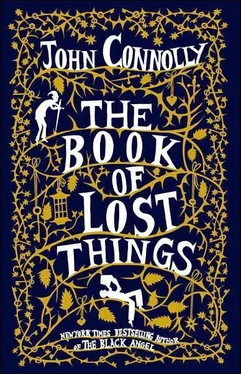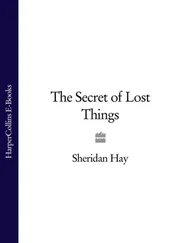Roland did not answer for a time, then he said, “I was once more than a soldier. My father was lord of a vast estate, and I was his eldest son and heir. But he did not approve of me or of the way that I lived my life. We argued, and in a fit of anger he banished me from his presence and from his lands. It was not long after our fight that my quest for Raphael began.”
David wanted to ask more, but he sensed that whatever lay between Roland and Raphael was private and very personal. To pursue it further would have been rude, and would have been hurtful to Roland.
“And you?” asked Roland. “Tell me more about yourself and your home.”
And David did. He tried to explain some of the wonders of his own world to Roland. He told him of airplanes and radio, of cinemas and cars. He spoke of the war, of the conquest of nations and the bombing of cities. If Roland thought these things were extraordinary, he did not show it. He listened to them the way an adult might listen to a child’s constructed tales, impressed that a mind could create such fantasies but reluctant to share their creator’s belief in them. He seemed more interested in what the Woodsman had told David of the king, and of the book that held his secrets.
“I too have heard that the king knows a great deal about books and stories,” said Roland. “His realm may be falling to pieces around him, but he always has time for talk of tales. Perhaps the Woodsman was right to try to lead you toward him.”
“If the king is weak, as you say, then what will happen to his kingdom when he dies?” asked David. “Does he have a son or a daughter who will succeed him?”
“The king has no children,” said Roland. “He has ruled for a very long time, since before I was born, but he has never taken a wife.”
“And before him?” asked David, who had always been interested in kings and queens and kingdoms and knights. “Was his father king?”
Roland struggled to remember.
“There was a queen before him, I think. She was very, very old, and she announced that a young man, one whom nobody had ever seen before but who was soon to come, would rule the realm in her place. That was what happened, according to those who were alive then. Within days of the young man’s arrival, he was king, and the queen went to her bed and fell asleep and never woke again. They say that she seemed almost . . . grateful to die.”
They came to a stream, frozen over by the plummeting temperature, and there they decided to rest for a short while. Roland used the hilt of his sword to break the ice so that Scylla could drink from the water beneath. David wandered along the edge of the stream while Roland ate. He was not hungry. Fletcher’s wife had given him great slabs of homemade bread and jam for breakfast that morning, and they were still sitting in his stomach. He sat on a rock and dug in the snow for stones to throw upon the ice. The snow was deep, and soon his arm was buried in it. His fingers touched some pebbles—
And a hand shot out of the snow beside him and gripped him just above the elbow. It was white and thin, with long, jagged nails, and with enormous force it pulled him from the rock and into the snow. David opened his mouth to yell for help, but a second hand appeared and clamped itself across his lips. He was dragged beneath the drift, the snow falling on top of him so that he could no longer see the trees and sky above, the hands never loosening their hold upon him. He felt hard ground at his back and was overcome by a terrible sense of suffocation, and then the earth too collapsed and he found himself in a hollow of dirt and stone. The hands released him, and a light shone through the darkness. Tree roots hung down from above, gently caressing his face, and David saw the openings of three tunnels, their mouths converging on this one spot. Yellowing bones lay in one corner, the flesh that once covered them long since rotted or consumed. There were worms and beetles and spiders all around, scurrying and fighting and dying in the moist, cold earth.
And there was the Crooked Man. He squatted in a corner, one of those pale hands that had dragged David down now holding a lamp while the other gripped a huge black beetle. As David watched, the Crooked Man put the struggling insect into his mouth, head first, and bit it in half. He chewed on the beetle, all the time watching David. The bottom half of the insect kept moving for a few seconds, then stopped. The Crooked Man offered it to David. David could see part of its insides. They were white. He felt very sick.
“Help me!” he shouted. “Roland, please help me!”
But there was no reply. Instead, the vibrations of his cries merely dislodged dirt from the roof of the hollow. It fell on his head and into his mouth. David spit it out, then prepared to shout again.
“Oh, I wouldn’t do that,” said the Crooked Man. He picked at his teeth and extracted a long, black beetle leg that had lodged close to his gums. “The ground here isn’t stable, and with all that snow above, well, I don’t like to think what would happen if it came down on top of you. You’d die, I expect, and not very pleasantly.”
David closed his mouth. He did not want to be buried alive down there with the insects and the worms and the Crooked Man.
The Crooked Man worked on the lower half of the beetle, removing its back to expose its innards entirely.
“Are you sure you don’t want any?” he asked. “They’re very good: crunchy on the outside, soft on the inside. Sometimes, though, I find that I don’t want crunchy. I just want soft.”
He lifted the insect’s body to his mouth and sucked at its flesh, then threw the husk into a corner.
“I thought that you and I should have a talk,” he said, “without the risk of your, um, ‘friend’ up there interrupting us. I don’t think you’ve fully grasped the nature of your predicament. You still seem to think that allying yourself with every passing stranger will help you, but it won’t, you know. I’m the reason you’re still alive, not some ignorant Woodsman or disgraced knight.”
David couldn’t bear to hear the men who had helped him dismissed like that. “The Woodsman wasn’t ignorant,” he said. “And Roland argued with his father. He isn’t a disgrace to anyone.”
The Crooked Man grinned unpleasantly. “Is that what he told you? Tut, tut. Have you seen the picture he carries in his locket? Raphael, isn’t that the name of the one whom he seeks? Such a nice name for a young man. They were very close, you know. Oooh, very close.”
David didn’t know quite what the Crooked Man meant, but the way he spoke made David feel dirty and soiled.
“Perhaps he would like you to be his new friend,” continued the Crooked Man. “He looks at you in the night, you know, when you’re asleep. He thinks you’re beautiful. He wants to be close to you, and closer than close.”
“Don’t talk about him that way,” warned David. “Don’t you dare.”
The Crooked Man sprang from the corner, leaping like a frog, and landed in front of David. His bony hand grasped the boy’s jaw painfully, the nails digging into his skin.
“Don’t tell me what to do, child ,” he said. “I could tear your head off if I chose, and use it to adorn my dinner table. I could bore a hole in your skull and stick a candle in it, once I’d eaten my fill of whatever was inside—which wouldn’t be much, I expect. You’re not a very bright boy, are you? You enter a world you don’t understand, chasing the voice of someone you know is dead. You can’t find your way back again, and you insult the only person who can help you return, namely me. You are a very rude, ungrateful, and ignorant little boy.”
With a snap of his fingers, the Crooked Man produced a long, sharp needle, threaded with coarse black string made from what looked like the knotted legs of dead beetles.
Читать дальше












